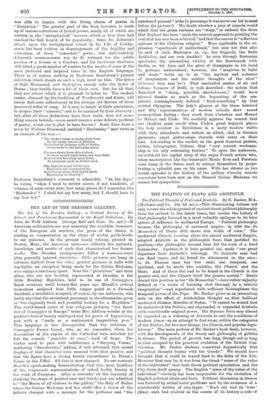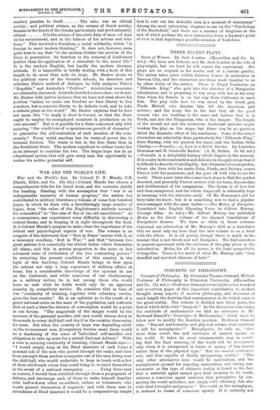THE POLITICS OF PLATO AND ARISTOTLE.
The Political Thought of Plato and Aristotle. By E. Barker, M.A. (Methuen and Co. 10s. 6d. net.)—This illuminating volume not only covers the whole ground of ancient Greek political philosophy from the earliest to the latest times, but carries the history of that philosophy forward in a most valuable epilogue to its later sphere of influence in mediaeval Europe. " Political philosophy became the philosophy of universal empire : in 1300 the be Monarchia of Dante still shows this width of view." The mediaeval Church, looming above the unreal mediaeval Empire, adopted Aristotle as the philosophic force that justified its position,—the philosophic servant that did the work of a hard taskmaster. Aquinas, it is here pointed out, made "one great departure from Aristotle's teleology. To Aristotle man had one final cause, and he found its attainment in the allies : to St. Thomas man has two ends, one temporal, one spiritual, and he needs two societies, the Church and the State. And of these the end to be found in the Church is the greater end, and the Church itself the greater society." Dante denied this position in his " De Monarchia "—here rather unjustly defined as "a waste of learning shot through by a historic imagination "—and repudiated with sufficient thoroughness the temporal power of the Pope. Mr. Barker gives us an interesting note on the effect of Aristotelian thought on that brilliant mediaeval thinker, Marsilio of Padua. " It cannot be denied that he understood the Politics, and expounded or expanded Aristotle with considerable original newer. His Defensor Pacis may almost be regarded as a widening of Aristotle to suit the conditions of modern times—as an attempt to find room, within the categories of the Politics, for two new things, the Church, and popular legis- latures." The main portion of Mr. Barker's book deals, however, with the developments of the theory and philosophy of politics in Greece. The period of growth was long, though not so long as that occupied by the practical evolution of the British Con- stitution. Mr. Barker declares somewhat dogmatically that "political thought begins with the Greeks." We should have thought that it could be traced back to the delta of the Nile. However that may be, it was from the Greek " sense of the value of the individual" that both Greek political speculation and the City-State itself sprang. The English "sense of the value of the individual" similarly has been responsible for the evolution of English political ideals and facts. Political discussion in Greece was fostered by actual social problems and by the existence of a considerable variety of city-types. "Each city had its `tone' • Wes): each had evolved in the course of its history a code of conduct peculiar to itself The infAis was an ethical
society ; and political science, as the science of Greek society, became in the hands of the Greeks particularly and predominantly
ethical It is the science of the whole duty of man—of man in his environment, and in the fulness of his actions and rela- tions." This involved a Socialism, a social solidarity, which " is foreign to most modern thinking." It does not, however, seem quite true to say that "to the modern thinker the mission of the State is preventive: its function is the removal of hindrances (rather than the application of a stimulus) to the moral life." It is the modern English, but hardly the modern German, attitude. It is impossible in briefly dealing with a book of this length to do more than note its scope. Mr. Barker shows us the political views of the Socratic schools, he describes and criticises Plato's method of dialogue, he fully analyses Plato's "Republic" and Aristotle's "Politics." Aristotelian economics are admirably discussed. Aristotle justified a slave class; we do not. Mr. Barker with justice declares that we have not risen above his position "unless we make our freedom no bare liberty to live somehow, but a concrete liberty to do definite work, and to take a definite place in the world." Mr. Barker explains that be does not mean this "to imply le droit de travail, or that the State ought to employ its unemployed members in production on its own account." But is it possible for a State concerned only with securing "the conditions of a spontaneous growth of character" to guarantee the self-realisation of each member of the com- munity ? Every social machine has its waste of power due to internal friction. The waste is less in the free State than in the Socialistic State. The modern expedient to reduce waste lies in an attempt to combine the two. The larger hope lies in an educational system that will give every man the opportunity to realise his nobler potential self.































































 Previous page
Previous page